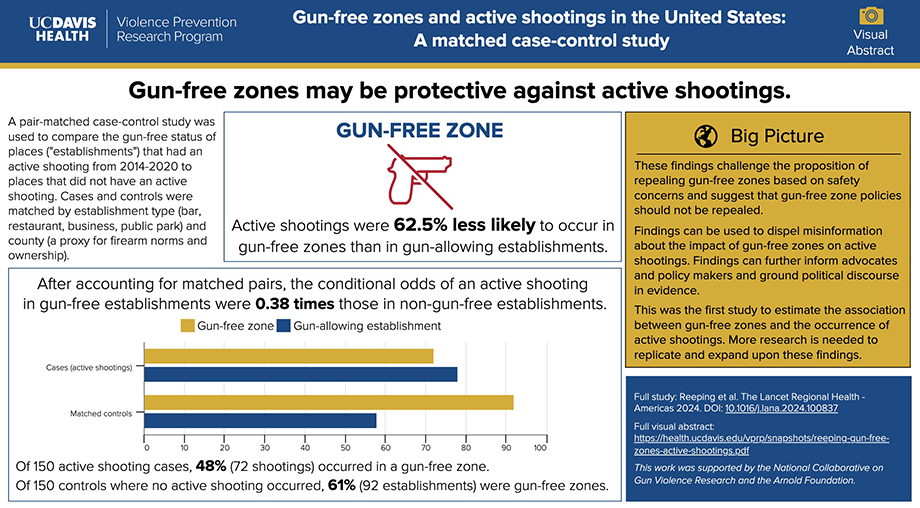Gun-free zones have often been blamed for making schools, malls and other public areas more attractive to shooters; however, there have been no quantitative studies examining those claims. Now, in a first of its kind study published in The Lancet Regional Health Americas, researchers at UC Davis Health and other institutions have shown that gun-free zones may, in fact, reduce the risk of mass shootings.
"Our most significant finding is that gun-free zones don't attract active shooters," said the study's first author, Paul Reeping, an injury epidemiologist and postdoctoral scholar at the Violence Prevention Research Program at UC Davis. "The study actually shows that gun-free zones have a preventive effect. The biggest takeaway is that the claim that gun-free zones are more dangerous is simply not true."
Gun-free zones vary by federal, state and local statutes. In Texas, for example, if more than 50% of a bar's revenue comes from alcohol, that establishment is considered gun-free. While most people might think the designation mostly applies to schools, theaters, sporting venues and other public places, private companies can also implement them at their own discretion.

A unique study design to match places at risk
The study included researchers from Columbia University and the University of Michigan. The team looked at 150 places in the U.S. that had experienced active shootings between 2014 and 2020. The researchers also found 150 places that could have experienced a shooting but did not, and designated them as controls. These control places were matched to the group with shootings by county, year and type of establishment.
"For a long time, people didn't think this work could be done," Reeping said. "We used a unique design that matched places based on similar criteria but very different outcomes — in this case, shootings."
The team found that 72 (48%) of the shootings happened in gun-free zones. Looking at the 150 controls that had no shootings, 92 (61.3%) were gun-free. Their study suggests that the gun-free zones may have reduced the risks of a mass shooting.
"After accounting for matched pairs, our analyses showed that active shootings were 62.5% less likely to occur in gun-free establishments than in gun-allowing places," Reeping said. "Therefore, it is very unlikely that active shooters are targeting gun-free zones; conversely, gun-free zones may be protective."
This work could have significant policy implications. The Supreme Court's 2022 Bruen decision gave Americans the right to carry loaded firearms in public. However, gun-free zones provide a constitutional carve-out that some governments have embraced, although these carve-outs are still being challenged in court.
Still, more work must be done to confirm these findings. "This is the first time this type of study has ever been done, and we hope more will follow," Reeping said. "Most people believe gun-free zones are actually more dangerous, and the evidence from our study doesn't support that."






